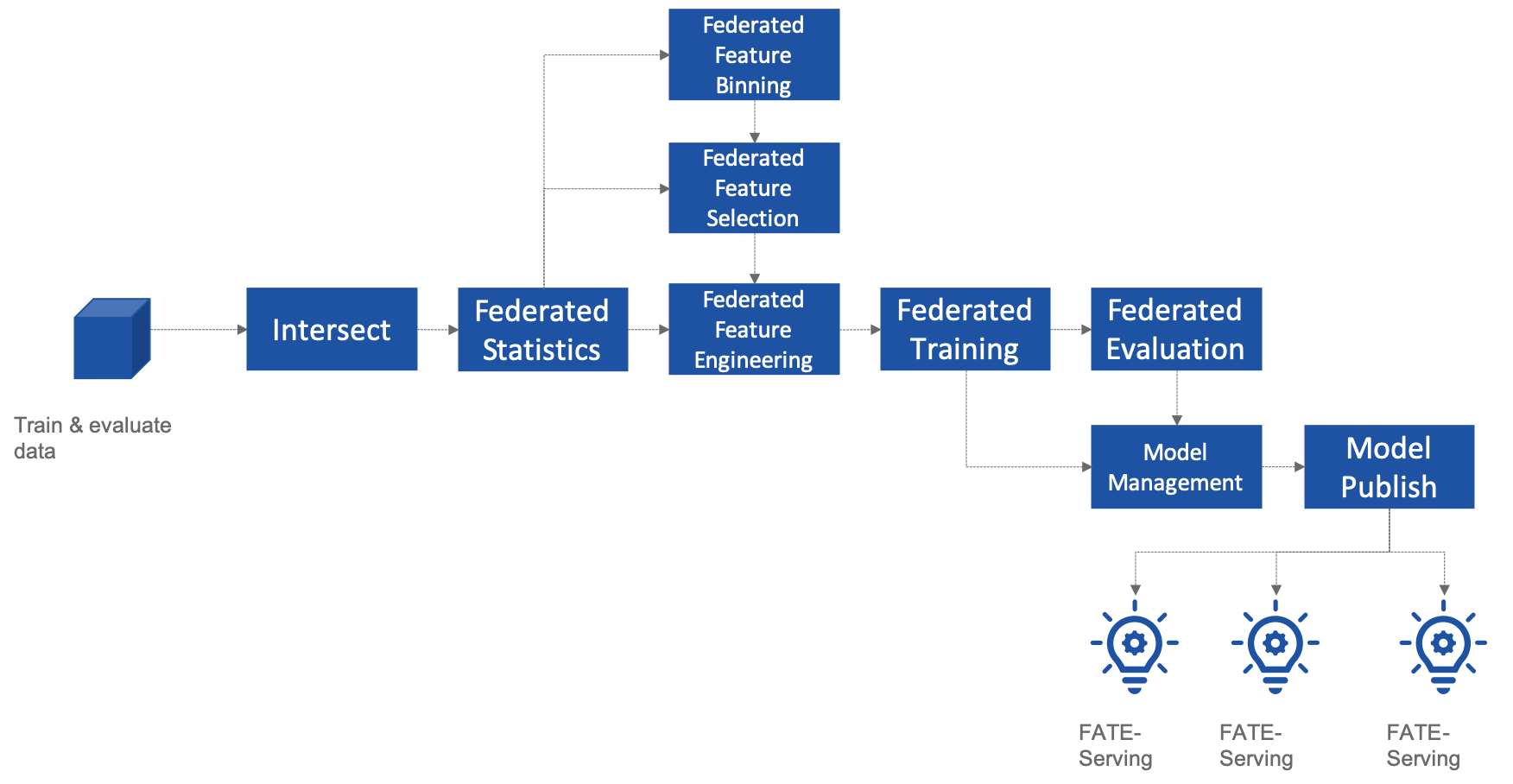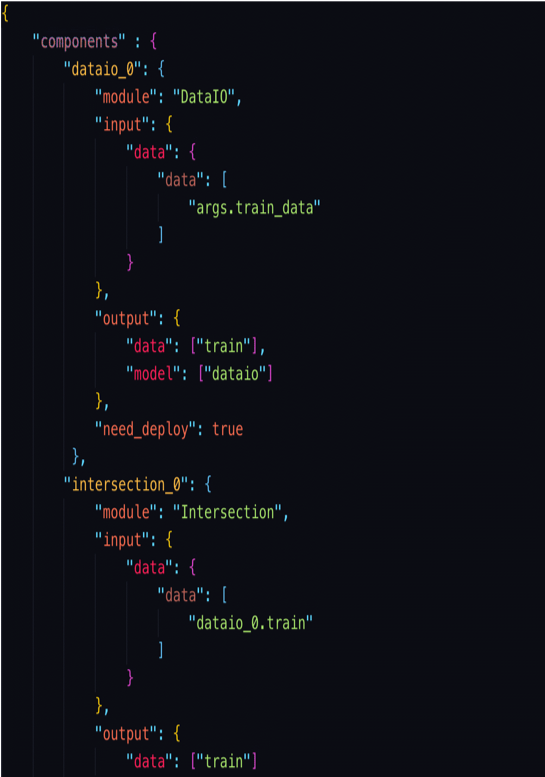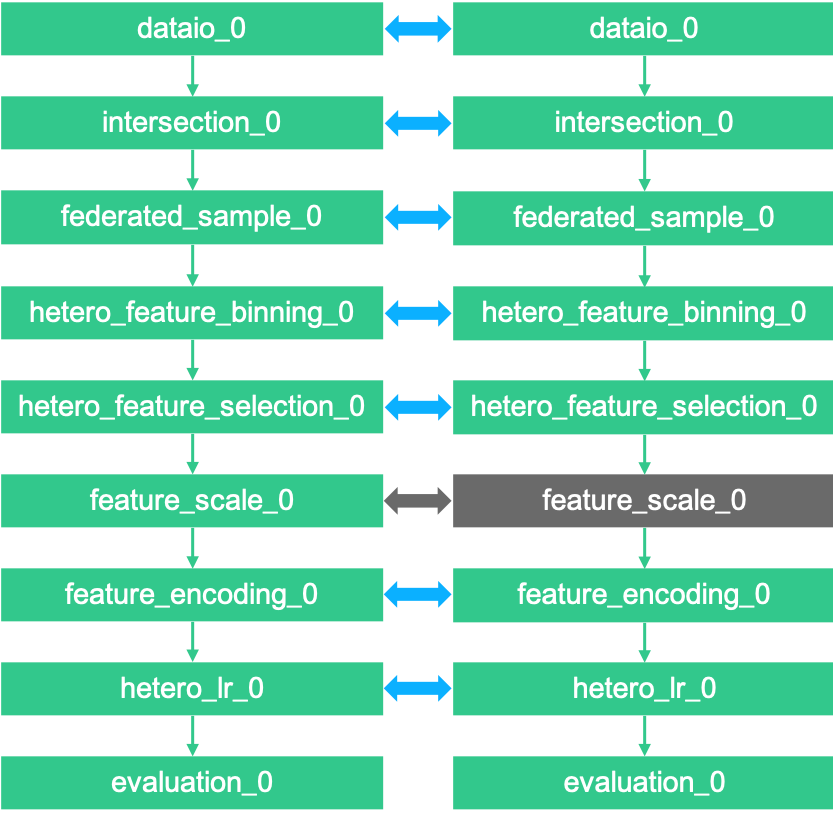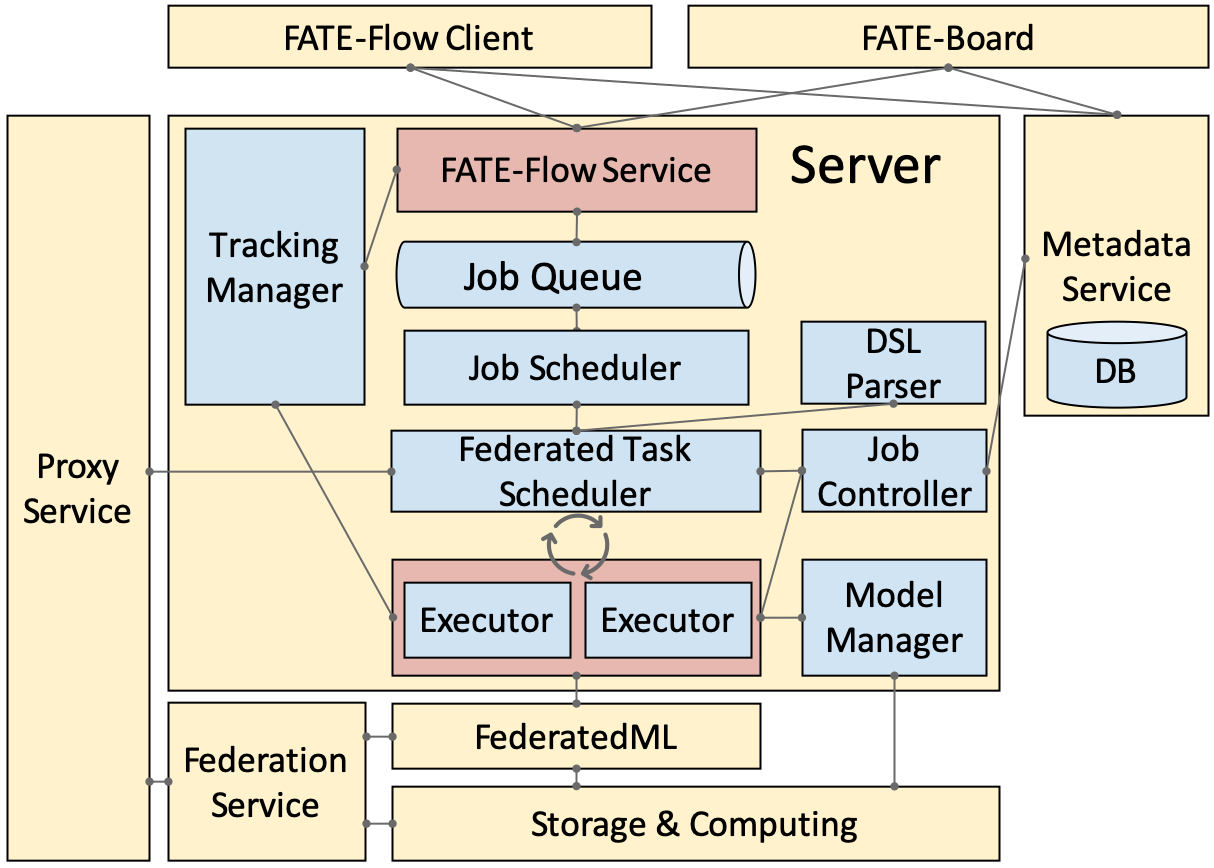FATE-Flow is a end to end pipeline platform for Federated Learning. Pipeline is a sequence of components which is specifically designed for highly flexible, high performance federated learning tasks. That includes data processing, modeling, training, verification, publishing and serving inference.
- DAG define Pipeline
- Describe DAG using FATE-DSL in JSON format
- FATE has a large number of default federated learning components, such as Hetero LR/Homo LR/Secure Boosting Tree and so on.
- Developers can easily implement custom components using Basic-API and build their own Pipeline through DSL.
- Federated Modeling Task Life-cycle Manager, start/stop, status synchronization and so on.
- Powerful Federated Scheduler, support multiple scheduling strategies for DAG Job and Component Task.
- Real-time tracking of data, parameters, models, and metric during the experiment.
- Federated Model Manager, model binding, versioning and deployment tools.
- Provide HTTP API and Command Line Interface.
- Data and interface support for modeling visualization on FATE-Board.
Only one step is required to configure a component for pipeline.
- define the module of this component
- define the input, includes data, model or isometric_model(only be used for FeatureSelection)
- define the output, includes data and model
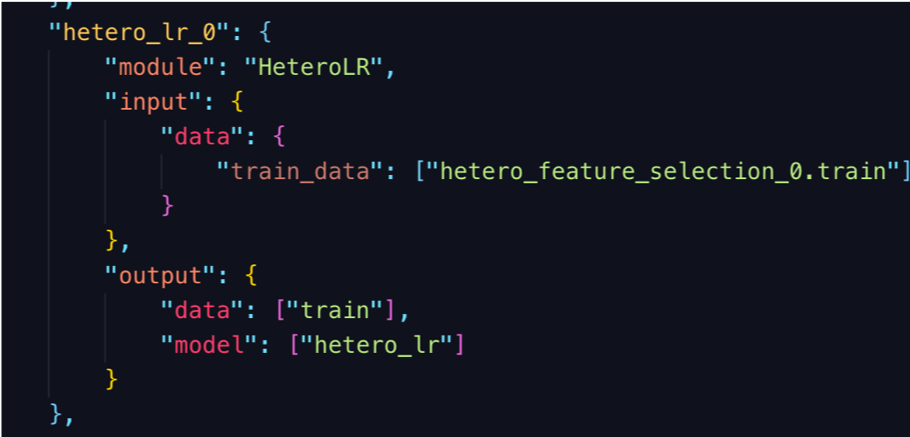
Fate-flow is deployed in $PYTHONPATH/fate_flow/. It depends on two configuration files: $PYTHONPATH/arch/conf/server.conf, $PYTHONPATH/fate_flow/settings.py
Server.conf configures the address of all FATE services. FATE-Flow of different deployment modes needs different fate services. For details, please refer to the following specific deployment mode.
Key configuration item description:
| Configuration item | Configuration item meaning | Configuration item value |
|---|---|---|
| IP | listen address for FATE-Flow | default 0.0.0.0 |
| GRPC_PORT | listen port for the grpc server of FATE-Flow | default 9360 |
| HTTP_PORT | listen port for the http server of FATE-Flow | default 9380 |
| WORK_MODE | the work mode of FATE-Flow | 0 for standalone, 1 for cluster |
| USE_LOCAL_DATABASE | Whether to use a local database(sqlite) | False for no, True for yes |
| MAX_CONCURRENT_JOB_RUN | Pipeline jobs that are executed in parallel at the same time | default 5 |
| DATABASE | configuration for mysql database | custom configuration |
| REDIS | configuration for redis | custom configuration |
| REDIS_QUEUE_DB_INDEX | the redis db index of redis queue | default 0 |
Server start/stop/restart script
| Configuration item | Configuration item meaning | Configuration item value |
|---|---|---|
| PYTHONPATH | the python path | Absolute path to the parent directory of the FATE-Flow |
| venv | the python virtual environment | custom configuration, such as /data/projects/fate/venv, not /data/projects/fate/venv/bin/activate |
You only need to start the FATE-Flow service to run the federated learning modeling experiment.
| Configuration item | Configuration item value |
|---|---|
| WORK_MODE | 0 |
| USE_LOCAL_DATABASE | True |
- Use Sqlite as database, db file is fate_flow_sqlite.db on the FATE-Flow root directory.
- Use in-process queue as job queue.
- Multi-Party communication loop back.
- But can not use FATE-Board because it doesn't support sqlite! In the next version board will support sqlite.
You need to deploy three service:
- MySQL
- FATE-Flow
- FATE-Board
FATE provides a standalone version of the docker for experience.please refer to docker version deploy guide at docker-deploy.
FATE provides a tar package with basic components to enable users to run FATE in a stand-alone environment, in which users are required to install dependent components on their own.please refer to manual deploy guide at manual-deploy.
| Configuration item | Configuration item value |
|---|---|
| WORK_MODE | 0 |
| USE_LOCAL_DATABASE | False |
| DATABASE | configuration for mysql database |
- Use MySQL as database.
- Use in-process queue as job queue.
- Multi-Party communication loop back.
- Support visualization by FATE-Board !
FATE also provides a distributed runtime architecture for Big Data scenario. Migration from standalone to cluster requires configuration change only. No algorithm change is needed. To deploy FATE on a cluster, please refer to cluster deploy guide at cluster-deploy.
| Configuration item | Configuration item value |
|---|---|
| WORK_MODE | 1 |
| DATABASE | configuration for mysql database |
| REDIS | configuration for redis |
- Use MySQL as database.
- Use redis queue as job queue.
- Multi-Party communication use proxy.
- Support visualization by FATE-Board !
FATE-Flow provide REST API and Command Line Interface. Let's start using the client to run a Federated Learning Pipeline Job example(Standalone).
python fate_flow_client.py -f upload -c examples/upload_guest.json
python fate_flow_client.py -f upload -c examples/upload_host.jsonpython fate_flow_client.py -f submit_job -d examples/test_hetero_lr_job_dsl.json -c examples/test_hetero_lr_job_conf.jsonCommand response example:
{
"data": {
"board_url": "http://localhost:8080/index.html#/dashboard?job_id=2019081718211974471912&role=guest&party_id=10000",
"job_dsl_path": "xxx/jobs/2019081718211974471912/job_dsl.json",
"job_runtime_conf_path": "xxx/jobs/2019081718211974471912/job_runtime_conf.json",
"model_info": {
"model_id": "arbiter-10000#guest-10000#host-10000#model",
"model_version": "2019081718211974471912"
}
},
"jobId": "2019081718211974471912",
"meta": null,
"retcode": 0,
"retmsg": "success"
}Some of the following operations will use these response information.
python fate_flow_client.py -f query_job -r guest -p 10000 -j $job_idAnd then, you can found so many useful command from CLI.
For more Federated Learning pipeline Job example, please refer at federatedml-1.0-examples and it's README
Publish model to FATE-Serving, and then using Serving's GRPC API to inference. Please confirm that you have deployed FATE-Serving and configured the service address in server.conf. You can refer to the cluster deployment.
python fate_flow_client.py -f load -c examples/publish_load_model.jsonPlease replace the corresponding configuration in publish_load_model.json with your job configuration.
After that, you can make online inference request to FATE-Serving by specifying the model id and model version used.
python fate_flow_client.py -f online -c examples/publish_online_model.jsonPlease replace the corresponding configuration in publish_online_model.json with your job configuration.
After that, the FATE-Serving uses the configuration you provided to set the party's default model id and the default model version that involves the model id.
And then, will you can make online inference request to FATE-Serving by only specifying the party_id or the model id.
$PYTHONPATH/logs/fate_flow/
$PYTHONPATH/logs/$job_id/
- In this version, the job that uploads/downloads data is not a job of pipeline type, so you cannot use the query job command to query the status. Please check the
$PYTHONPATH/jobs/$job_id/std.log, sorry for the inconvenience. - In the next version, the upload/download data will be upgraded, and you can use the query job command to query the status.
- Usually we recommend using the job_log command by fate_flow_client to download the job log to a custom directory.
- If you cannot download the log under certain abnormal conditions, go to
$PYTHONPATH/logs/fate_flow/fate_flow_stat.logto view it.
